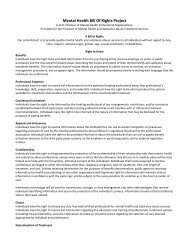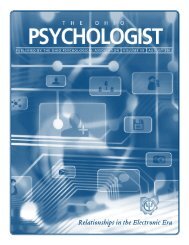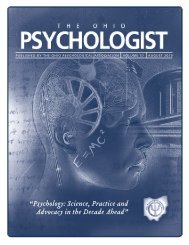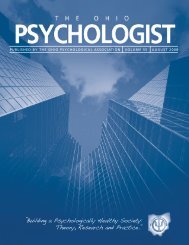The OP Review November 2005 - Ohio Psychological Association
The OP Review November 2005 - Ohio Psychological Association
The OP Review November 2005 - Ohio Psychological Association
You also want an ePaper? Increase the reach of your titles
YUMPU automatically turns print PDFs into web optimized ePapers that Google loves.
Internet access was rated the highest (excellent) and staff access to technology continuing education the lowest (fair). Average<br />
ratings for software, staff expertise and Web site capabilities were rated good. Hardware capabilities were rated midway between<br />
excellent and good.<br />
Although all associations have Web sites, comments on the survey indicated that several associations are in process of upgrading<br />
their Web sites to increase their capabilities (e.g. adding member only sections and staff having more ability to manage their Web site).<br />
A number of associations reported using their Web sites for members to renew membership, register for educational events, post<br />
association publications, provide access to membership directories and post recent news. Several associations commented on<br />
the significant potential benefits to association members in expanding the capabilities of their Web sites in terms of rapid and<br />
efficient communication.<br />
In addition to using Web sites to communicate with members, associations are using electronic mail (e-mail). Forty-three percent of<br />
the associations offer members the option of receiving the association’s publications and information electronically. In those associations<br />
that offer electronic distribution as an option, the percentages of members who choose to use it range from 20-85 percent.<br />
A median average of 85 percent of association members have provided e-mail to their association. It is unclear, however, to what<br />
extent these e-mail addresses are regularly used to communicate with members (e.g. how many members are on association mail lists to<br />
receive regular e-mailings).<br />
Three associations offer electronic or e-memberships that typically are graduate or undergraduate psychology students who receive<br />
only electronic association mailings.<br />
One of the survey questions asked about the extent to which associations use electronic communications and distribute meeting<br />
materials to association board members. A quarter of the associations surveyed require board members to have electronic<br />
communication capability. Half of the associations distribute board materials electronically. A fifth only distribute paper copies<br />
of board materials at the board meetings. A little more than half (58 percent) use both electronic and paper copies of materials for<br />
board meetings.<br />
Technology Priorities<br />
<strong>Association</strong> priorities for improving association technological capabilities and helping association members to become more aware<br />
and proficient in using technology are presented in Table 2 below:<br />
Table 2-<strong>Association</strong> Technology Priorities<br />
Improving <strong>Association</strong> Increasing Member<br />
Priority Technology Capabilities Technology Capabilities<br />
High 44% 22%<br />
Mid 30% 48%<br />
Low 26% 30%<br />
Nearly three fourths of the associations considered improving<br />
their technological capabilities to be either a high (44 percent) or a<br />
mid-level (30 percent) priority. About two-thirds rated helping<br />
association members to become more aware and proficient in the<br />
use of technology as either a high (22 percent) or mid-level (48<br />
percent) priority.<br />
<strong>Association</strong> resources devoted to developing and promoting<br />
technology are generally limited. Only two out of 24 (8 percent)<br />
associations (<strong>Ohio</strong> and Kentucky) have committees with a purpose<br />
of educating members about the use of technology in psychology.<br />
A few association executive directors reported that they or other<br />
association staff spend some time on educating or training in this<br />
area. Some reasons for this appear to be limited available staff<br />
time, finances, other higher association priorities, lack of expressed<br />
interest by association members and, apparently in some states,<br />
the inability for psychologists to obtain licensing board approval<br />
for mandatory continuing education credit for technology related<br />
training. <strong>Association</strong>s that viewed this as a high priority typically<br />
had members expressing an interest in technology and reported<br />
recognizing this as a legitimate function of their association for<br />
educating psychologists that would improve their members<br />
practices, improve efficiency in communications with members<br />
and others, could save staff time and association finances and<br />
even attract new members.<br />
<strong>OP</strong>A REVIEW 13<br />
Educational Activities<br />
A third of the associations reported to have presented or<br />
sponsored educational presentations, workshops or published<br />
articles in the past 12 months related to technology. <strong>The</strong>se<br />
included workshops or presentations about such topics as HIPAA<br />
compliance, using specific software (e.g. Outlook, Word,<br />
PowerPoint), computer system maintenance, using Web sites (e.g.<br />
APA Portal, association Web site) and articles about technology<br />
“tips,” e-mailing attachments, basics about using personal<br />
computers and handheld computers, and Internet resources for<br />
psychologists.<br />
Thirty-eight percent of the associations indicated that they are<br />
planning educational activities related to technology during the<br />
next 12 months. <strong>The</strong>se were similar to those reported for the past<br />
12 months and included workshops and presentations about<br />
designing a Web site, using specific software programs and<br />
HIPAA compliance. One innovative state (Idaho) plans to jointly<br />
sponsor with a state counseling association a program about using<br />
FrontPage (a computer program for building Web sites).<br />
Two associations referred to the inability of their members to<br />
receive mandatory continuing education (MCE) for technology<br />
related educational activities. Although it is unclear if this is due<br />
to an explicit prohibition by regulatory boards, it may be an<br />
inhibiting factor for psychologists pursing such training.<br />
Continued on page 14 >











